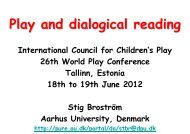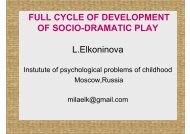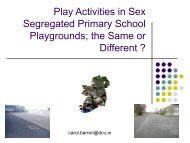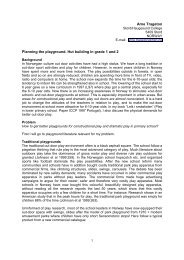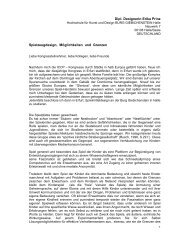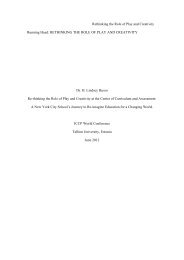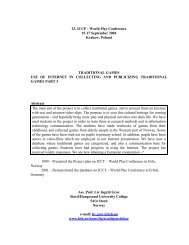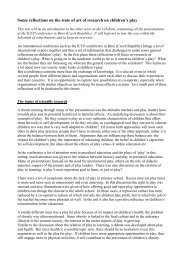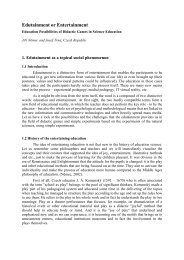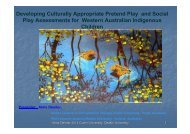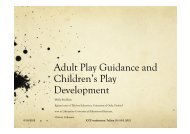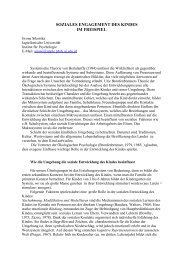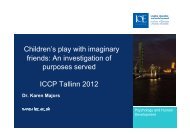Curriculum, play and teacher education for transition to kindergarten
Curriculum, play and teacher education for transition to kindergarten
Curriculum, play and teacher education for transition to kindergarten
Create successful ePaper yourself
Turn your PDF publications into a flip-book with our unique Google optimized e-Paper software.
<strong>Curriculum</strong>, <strong>play</strong> <strong>and</strong> <strong>teacher</strong><br />
<strong>education</strong> <strong>for</strong> <strong>transition</strong> <strong>to</strong><br />
<strong>kindergarten</strong><br />
James E. Johnson<br />
Penn State University<br />
USA
Play is only one means of learning<br />
<strong>and</strong> socialization<br />
Exploration<br />
Imitation<br />
Activity<br />
Appropriation<br />
Play
Some <strong>play</strong> is more preferred than<br />
other types of <strong>play</strong><br />
Trans<strong>for</strong>mative<br />
versus<br />
imitative(D.Levin)<br />
Mature versus<br />
immature <strong>play</strong>
Mature versus immature <strong>play</strong><br />
Mature Play<br />
Positive peer social<br />
interaction<br />
Explicit roles<br />
Implicit rules<br />
Not dependent on<br />
realistic props<br />
Elaborate multilayered<br />
scripts<br />
Persistence over time<br />
Immature Play<br />
Presence of peer<br />
conflicts<br />
Repetitive<br />
Dependent on concrete<br />
props<br />
Lack of explicit roles<br />
Implicit rule violation<br />
Unelaborated content<br />
Short duration
Types of Educational Play: Reception<br />
<strong>and</strong> Physical
Constructive Play
Dramatic Play
Outdoor Educational Play in Norway
Educational <strong>play</strong> is only one type of<br />
<strong>play</strong> that is important<br />
Res<strong>to</strong>rative Play<br />
Recreational Play<br />
Therapeutic Play<br />
Expressive Play<br />
Entertainment Play
Four Approaches <strong>to</strong> <strong>Curriculum</strong> <strong>and</strong><br />
Play<br />
H<strong>and</strong>s-off <strong>play</strong> orientation:<br />
Children benefit most<br />
from self-guided <strong>play</strong>.<br />
Adult intervention<br />
interferes with self<br />
expression.<br />
Non<strong>play</strong> approach:<br />
Play is distinct from <strong>and</strong><br />
less important than<br />
learning or work.<br />
Play can serve as a<br />
reward <strong>for</strong> working hard<br />
at school.<br />
Jeff Trawick-Smith(2001)<br />
Narrowly focused <strong>play</strong><br />
intervention:<br />
Certain types of <strong>play</strong> are<br />
most useful, such as sociodramatic<br />
<strong>play</strong>, block <strong>play</strong>,<br />
games.<br />
Adults intervene <strong>to</strong> foster<br />
specific <strong>play</strong> skills in these<br />
areas.<br />
Broad-based developmental<br />
approach:<br />
All types of <strong>play</strong> can be<br />
useful.<br />
Teachers seek <strong>to</strong> promote<br />
all areas of development.
Two connections: <strong>Curriculum</strong> <strong>and</strong><br />
<strong>play</strong><br />
(Van Hoorn, Nourot, Scales, & Alward, 1993)<br />
<strong>Curriculum</strong>-Generated Play:<br />
Teachers provide <strong>play</strong> experiences that<br />
enable children <strong>to</strong> learn concepts <strong>and</strong><br />
skills from curriculum areas such as<br />
literacy, mathematics, <strong>and</strong> science.<br />
Play be<strong>for</strong>e instruction allows <strong>teacher</strong><br />
<strong>to</strong> assess target skills <strong>and</strong> provide<br />
instruction <strong>to</strong> children who did not<br />
master the skill through <strong>play</strong>.<br />
Play following instruction gives children<br />
enjoyable,meaningful opportunities <strong>to</strong><br />
practice <strong>and</strong> consolidate skills taught.<br />
Play-Generated <strong>Curriculum</strong>:<br />
Teachers organize learning<br />
experiences around themes <strong>and</strong><br />
interests that children demonstrate in<br />
their <strong>play</strong>.<br />
Teachers frame space, time <strong>and</strong><br />
materials <strong>to</strong> invite children’s active<br />
participation in learn-full <strong>play</strong>.<br />
Quality of <strong>play</strong> as curriculum depends<br />
on Deweyan concepts of “continuum of<br />
a child’s experiences” <strong>and</strong> balanced<br />
“interaction” between internal<br />
subjective fac<strong>to</strong>rs <strong>and</strong> external reality<br />
constraints.
Building Quality ECE Programs with<br />
Play Blocks
Research in Support of Play in ECE<br />
<strong>Curriculum</strong><br />
Language <strong>and</strong> Literacy<br />
Imagination<br />
Mental States<br />
Creativity<br />
Social competence<br />
Learning Dispositions<br />
Self regulation:<br />
Physical,emotional, social<br />
<strong>and</strong> cognitive<br />
Coping <strong>and</strong> Resiliency
Play Practices <strong>and</strong> ECE Goals<br />
Concepts<br />
Skills<br />
Affect<br />
Dispositions
School Readiness <strong>and</strong> Value of Play<br />
Social-emotional<br />
readiness:<br />
Self regulation<br />
Emotional regulation<br />
Social skills:Sharing,<br />
turn-taking,helping,<br />
cooperating<br />
Cognitive-academic<br />
readiness:<br />
Language development<br />
Emergent literacy<br />
General knowledge<br />
Number <strong>and</strong> space<br />
concepts
<strong>Curriculum</strong> Models <strong>and</strong> Play<br />
High/Scope<br />
Creative <strong>Curriculum</strong><br />
Bank Street<br />
Pyramid<br />
Montessori<br />
Reggio Emilia<br />
Waldorf<br />
Tools of Mind
Waldorf Schools<br />
Weiner, Germany<br />
Vienna, Austria
Examples from Waldorf ECE<br />
Cozy spaces <strong>for</strong> pretend <strong>play</strong>
Playing Indoors <strong>and</strong> Outside Play<br />
Spaces
Waldorf Teacher <strong>and</strong> Picture<br />
Construction of <strong>play</strong><br />
materials<br />
Modeling<br />
Imitation<br />
Stewardship<br />
Lack of scaffolding<br />
during complex <strong>play</strong>
Waldorf Materials
Waldorf(Steiner) <strong>and</strong> Play<br />
Open space<br />
No Ready-Made Toys<br />
Screens<br />
Blocks, Tables<br />
No Pre-<strong>for</strong>med Play<br />
Environments<br />
Lengths of Cloth
Vivian Paley <strong>and</strong> Narrative <strong>Curriculum</strong>:<br />
S<strong>to</strong>ry Telling <strong>and</strong> S<strong>to</strong>ry Drama Process<br />
S<strong>to</strong>rytelling Table<br />
“would you like <strong>to</strong> tell me a s<strong>to</strong>ry”<br />
“I will write down what you say”<br />
Process<br />
Starting, Topics, Echoing, Finishing<br />
Choosing the cast<br />
Drama (at group time)<br />
Reread s<strong>to</strong>ry<br />
Enactment <strong>and</strong> Dialogue<br />
Finishing <strong>and</strong> Audience Claps
Blended Programs: Doors <strong>to</strong> Discovery<br />
Jim Christie--Arizona State University<br />
Large Group Instruction<br />
Song & Poem Charts<br />
Big Books (s<strong>to</strong>ry, concept, in<strong>for</strong>mational)<br />
Small Group Instruction<br />
Interactive Books (wordless big books)<br />
Big scrapbook (blank big book)<br />
Discovery Centers<br />
Literacy-enriched <strong>play</strong> centers<br />
Other theme-related center activities
Functions of Play in Doors <strong>to</strong><br />
Discovery<br />
Oral vocabulary: use of theme related words<br />
Print recognition: ex-- read signs in <strong>play</strong> area<br />
Concepts about print: practical functions of reading<br />
<strong>and</strong> writing<br />
Emergent reading <strong>and</strong> writing<br />
Positive affect <strong>and</strong> attitudes about literacy<br />
Create “zone of proximal development” in which<br />
adults <strong>and</strong> more capable peers help children engage<br />
in literacy activities that they cannot do on their own.
Literacy-Enriched Dramatic Play<br />
Camping<br />
Construction site
Literacy-Enhanced Dramatic Play<br />
Taking orders<br />
The staff
Literacy Enhanced Play<br />
Constructive <strong>play</strong><br />
Dramatic Play
Other Play Activities<br />
Big Scrap Book<br />
Miniature Toy Play<br />
Games<br />
Constructive Play
Examples of Themes <strong>and</strong> Props<br />
Boat<br />
Life vests, crew name tags,<br />
compass,signs<br />
Large cardboard box <strong>for</strong><br />
boat<br />
Restaurant<br />
Menus, <strong>play</strong> money,discount<br />
coupons<br />
Bags <strong>for</strong> take-home<br />
Post Office<br />
Pretend stamps(stickers)<br />
Stationary, envelopes<br />
School<br />
Easel, pointer, name tags<br />
Chalkboard & Chalk<br />
Health Clinic<br />
Clipboad, patient folders<br />
Wall signs, insurance<br />
cards, health charts<br />
Camping<br />
Compass, maps<br />
Signs, food containers<br />
Tent, cardboard s<strong>to</strong>ve
REDI Head Start Model :Research-<br />
Based,Developmentally In<strong>for</strong>med<br />
Karen Bierman, Penn State University<br />
Educational <strong>and</strong><br />
Preventive Interventions<br />
Universal <strong>and</strong> Indicated<br />
Programs Targeting<br />
Protective Domains<br />
Integrated Model of<br />
ECE Programs<br />
Enrich, not replace,<br />
curriculum <strong>for</strong> language<br />
<strong>and</strong> literacy <strong>and</strong> social<br />
emotional <strong>and</strong> selfregula<strong>to</strong>ry<br />
skills.<br />
Build on existing<br />
infrastructure; <strong>teacher</strong><br />
ownership<br />
Links <strong>to</strong> parent-focused<br />
programs
Program Design<br />
Packaged <strong>and</strong> Scaled Up<br />
Impact can favor some groups, some<br />
settings more than others<br />
Play as context<br />
Play as medium
Research <strong>and</strong> Evaluation<br />
What works?<br />
What works best<br />
with whom, in which<br />
contexts, using<br />
which specific<br />
methods?<br />
Short-term impact<br />
Long-term impact<br />
Assessment<br />
development<br />
Teacher action<br />
research
Teacher Preparation<br />
Educational Philosophy: Weikart (1972)
Teacher Preparation (Cont.)<br />
Integrated Pedagogical Model (Wood, 2006)
School Readiness, Life Readiness, <strong>and</strong><br />
Being Ready <strong>for</strong> Children<br />
Diminution of Play<br />
Child’s Right <strong>to</strong> Play<br />
Play as Leading Activity<br />
Underlying universal competence<br />
Not specific skills
Questions <strong>and</strong> Answers<br />
Jej4@psu.edu



